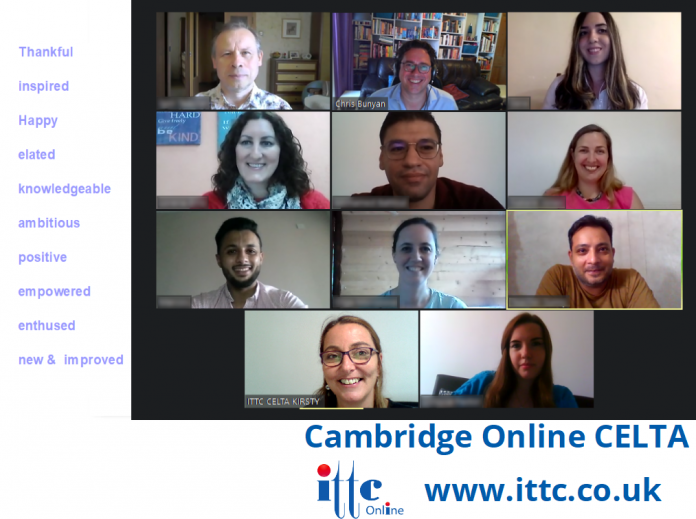When Covid-19 arrived, ITTC was quick to take its courses online. Chris Bunyan, its Joint Head of Training, shares how they did it
“We had been offering our Online DELTA Module 3 course for six years already,” says Chris Bunyan, ITTC’s Joint Head of Training. “It’s a one-to-one course, with video consultations with the DELTA overseeing their assignment, as well as access to video webcasts and online materials, so we already had a few things in place for going online when Covid came along.
“Clive Barrow is the owner/ MD of BEET Language Centre, of which ITTC is a part. He and others did some research and came to the conclusion that Zoom was going to be the right way to go, and indeed BEET has also been using it for their hybrid classes for most of the last year. It allows us to use our existing interactive whiteboard technology, as well as continue to promote very student- centred learning.
“That meant we could move pretty quickly. It also means that the trainees on our online courses are getting trained in the technology and smartboards that many of them will be using if and when they go back to a physical classroom after lockdown.
“We were in the middle of a part-time CELTA when the UK lockdown happened, but we had seen it coming and had moved the course online a couple of weeks before it came into effect. Because of our experience and flexibility, we were quickly able to continue the input online, but that left teaching practice. Obviously the candidates hadn’t signed up for an online course, which is why half the teachers decided they wanted to come in during the summer when we were able to open safely for face- to-face teaching, and the other half completed their teaching practice online from various countries.
“As well as CELTA, in April last year we developed our modular Online Teacher Refresher Course (OTRC), building on our decades of experience running face-to-face Refresher Courses for teachers from all over the world. This has been very popular, and we’re running it this summer and at regular intervals throughout the year.
“After initial misgivings about going online, I think a lot of centres have been pleasantly surprised. It’s better in some ways, as we can show certain documents and online resources, and pull things up on the screens for everybody to focus on. The social side of online learning is also good. People form genuine bonds with tutors and fellow trainees, and on CELTA, with their students too. There’s a genuine warmth and camaraderie that comes through on courses like this, which are very always very collaborative.
“The feedback from the candidates has been fantastic, though the challenge is that we have to make it very clear to begin with what’s involved. We need to be very upfront. We do an online interview, where we begin to play with a bit of the software during the interview, so they get a feel for it. We let them know about the intensity of the course and we ensure that on the course we respect the breaks to make sure people get time away from screens during the day.
“We discovered genuine positives on the online courses, so we’ll definitely continue this in some form. We’ve got a face-to-face CELTA course in August and a parallel course at the same time online. For the rest of the year they alternate between online and face- to-face CELTAs, and we’ll see how that goes.
“It is possible to run the online CELTA input through the Moodle materials from Cambridge Assessment English, but we’ve gone with our own sessions and live input. We have found that is a benefit, a real strength, because the same tutors who watch candidates’ teaching practice are doing the input sessions. That means we can give them more practice in certain areas, we can demonstrate certain techniques, and let them in on the tips and tricks of how we’re doing things, so they’re getting tailored input in a very personal, reactive way.
“Going forward we’ll certainly continue online in some form. The feedback has all been excellent, with the Online Teacher Refresher Course being 100% positive. Lots of people will be happy to get back in the physical classroom here in Bournemouth, but it won’t be the end of our online training provision.”

Chris Bunyan has been in ELT since 1998 as a teacher, trainer, director of studies, assessor and, along with Lucy Cochrane, makes up the Head of Training team at ITTC in Bournemouth, part of BEET Language Centre. Chris has lived and worked in eight countries on four continents, given sessions for IATEFL, English UK South, Macmillan, and Saarland University, and has recently developed VocabDice.com, a vocabulary note-taking app.





